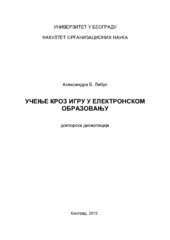Please use this identifier to cite or link to this item:
https://rfos.fon.bg.ac.rs/handle/123456789/66| Title: | Učenje kroz igru u elektronskom obrazovanju Edutainment in electronic education |
Authors: | Labus, Aleksandra | Contributors: | Despotović-Zrakić, Marijana Radenković, Božidar Stanojević, Milorad |
Keywords: | učenje kroz igru;sistem za upravljanje učenjem;elektronsko obrazovanje;društveni mediji;društvene mreže.;Social Networks.;Social Media;Learning Management System;Electronic Education;Edutainment | Issue Date: | 2012 | Publisher: | Univerzitet u Beogradu, Filozofski fakultet | Abstract: | Dostupnost savremenih informaciono-komunikacionih tehnologija znatno je uticala na proces učenja i podučavanja, kao i na način kreiranja strategija obrazovanja. Elektronsko obrazovanje jedan je od dominantnih pravaca razvoja procesa obrazovanja u velikom broju obrazovnih institucija i zajednica. Imajući u vidu da svaka strategija obrazovanja sa sobom nosi određene rizike, neophodno je dizajnirati modele elektronskog obrazovanja kako bi se izbegli potencijalni problemi i maksimizirale prednosti strategije. Kako bi se povećala efikasnost učenja i podučavanja, obrazovni proces je neophodno obogatiti atraktivnim interaktivnim sadržajem, koji studente uključuje u proces obrazovanja kao aktivne učesnike. Učenje kroz igru predstavlja jednu od savremenih metoda obrazovnog procesa koja doprinosi aktivnom učešću studenata u procesu obrazovanja. Predmet istraživanja doktorske disertacije jeste razvoj modela učenja kroz igru u elektronskom obrazovanju. Glavna hipoteza koja je razvijena i dokazana u okviru doktorske disertacije jeste da se implementacijom modela učenja kroz igru u elektronsko obrazovanje poboljšavaju performanse i kvalitet obrazovnog procesa, kvalitet komunikacije i saradnje između studenata i obrazovne institucije i postigne veće zadovoljstvo studenata. Učenje kroz igru (edutainment) se odnosi na hibridni metod obrazovanja koji koristi zabavne aktivnosti zasnovane na multimediji za realizaciju edukativnih aktivnosti. U procesu elektronskog obrazovanja često se upotrebljava sistem za upravljanje učenjem (Learning Management System- LMS). Moodle LMS je najčešće korišćeno softversko rešenje za upravljanje obrazovnim materijalima koje integriše sve realizovane celine doktorske disertacije... The availability of modern information and communication technology has significantly impacted the process of learning and teaching, as well as the process of education strategy creation. Hence, the vast majority of educational institutions and communities propose electronic education as one of the emerging research trends in the education process development. Having in mind that every education strategy bears certain risks, it is necessary to design electronic education models in order to avoid potential complications and maximize the benefits of the strategy. In order to enhance learning and teaching efficiency, educational process needs to be enriched with modern interactive content that stimulates students to actively participate in the education process. Edutainment represents one of the prevailing methods that enhance students’ active participation in the education process. The research topic of the dissertation is the development of the edutainment model in electronic education. The main hypothesis developed and proved in the dissertation is that the implementation of the edutainment model in electronic education enhances the performances and the quality of the educational process, quality of communication and collaboration processes between students and the educational institution, and achieves higher levels of students’ satisfaction. Edutainment refers to a hybrid education method that uses fun multimedia-based activities for materializing educational activities. The process of electronic education is often supported by Learning Management Systems (LMS). Moodle LMS is the most frequently used software solution for managing educational materials and it serves as a platform that integrates all implemented units of the dissertation. The analysis of the existing learning management system served as a basis for defining the structure of the proposed edutainment model in electronic education. The base elements of the proposed model include defined goals, preferences, motivation and needs of every student. The proposed edutainment model in electronic education comprises the infrastructure, the edutainment system architecture, and process of introducing edutainment into electronic education and edutainment services... |
URI: | https://nardus.mpn.gov.rs/handle/123456789/3214 http://eteze.bg.ac.rs/application/showtheses?thesesId=259 https://fedorabg.bg.ac.rs/fedora/get/o:5536/bdef:Content/download http://vbs.rs/scripts/cobiss?command=DISPLAY&base=70036&RID=515331994 https://rfos.fon.bg.ac.rs/handle/123456789/66 |
| Appears in Collections: | Doktorati |
Show full item record
This item is licensed under a Creative Commons License


